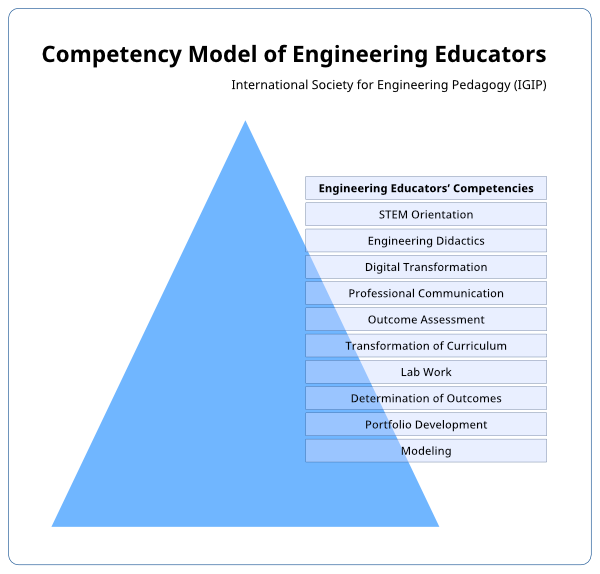



IGIP maintains a list of accredited international engineering educators who were awarded the title ING.PAED.IGIP. The title ING.PAED.IGIP certifies a certain educational level for a teacher, trainer or instructor, which is given by the IGIP curriculum.
Any engineering educator who passes the curriculum at any accredited training center for International Engineering Education or can present certificates on the individual modules of the curriculum, and whose education, training and professional experience meet the IGIP standards may register for the professional register as "International Engineering Educator ING.PAED.IGIP ".
Please download (bottom of the page) the ING.PAED.IGIP application form if you fulfill the criteria.
Please contact us if you need more information: office@igip.org.
IGIP accredits training centers for "International Engineering Educators", the teaching matter of which conforms to IGIP's curriculum for engineering pedagogy. These centers have to be reaccredited every five years. Contact imc@igip.org, if you want to be informed about your nearest accredited training center.
Please contact for more information or other questions: office@igip.org.
The new curriculum provides a modular pedagogy-based approach to methodological, didactical, and pedagogical excellence in the field of engineering education. The acquisition of the title “IGIP International Engineering Educator – ING.PAED.IGIP” represents an advanced form of personal and professional development which gives each graduate access to the network and experience of the global engineering education community.

All applicants for an “ING.PAED.IGIP” must study the subjects of the Prototype Curriculum as proposed by IGIP in any accredited IGIP Training Center. After completion of the program, an IGIP international engineering educator has acquired the competencies needed to teach at the highest standards.
The IGIP Prototype Curriculum is organized in modules (module areas), the workloads have to be given in ECTS (European Credit Transfer Points). The curriculum is also divided into compulsory modules and the elective modules, the latter can be chosen by the Accredited Training Center based on needs as well as on interests and must comprise at least 20 ECTS.
Each IGIP Training Center enjoys a high degree of flexibility and offers independent study courses based on the IGIP Prototype Curriculum.
In detail, the new prototype curriculum is divided into Module Areas and their corresponding/respective units.
The module areas and units are not limited to one discipline but are inter-disciplinary.
The related professional fields of action are:
| Modules of the IGIP Prototype Curriculum Compulsory and Elective | ||
|---|---|---|
| Compulsory | ECTS | Content |
| STEM Orientation | 1 | Paths to the career goal "engineer" (STEM-Orientation). Basic knowledge on the relationship between vocational and engineering education in the national context. |
| Engineering Didactics and Methodics | 4 | Unit 1: Design of Teaching and Studying Processes Unit 2: Media in EE Unit 3: Professional Communication Processes Unit 4: Control and Evaluation of Learning Outcomes in EE |
| Design of Academic Courses | 4 | Unit 1: Relationships between Lecture – Seminar – Consultation – Self Study Unit 2: Lab Didactics |
| Curriculum Theory and Practice | 2 | Unit 1: Determination of Study Goals and Qualifications/Competencies Unit 2: Teaching Protfolio |
| Modelling | 3 | From Theory to Application – Internships; Research Projects with Partners from Labour Market; Internationalization |
| Application | 3 | Unit 1: Best Cases, Best Practice Unit 2: Final Colloqium – Final Project |
| Electives | ECTS | Content |
| Selected Additional Units | 3 | e.g.: Coaching and Mentoring, Entrepreneurship, New Technologies, Sustainable Development, Closed Eco Systems; Peace Engineering; Digitization of Working Processes and Teaching… |
| Total – Minimum | 20 | |
The Prototype Curriculum should be open to country-specific adjustments. Also, the assessment of modules or units should be defined by country-specific conditions. For the realization of the curriculum, a compulsory engineering-related didactical approach should be developed, which does, however, not require any methodological limitations.
Furthermore, the target-group ranges for the IGIP prototype curriculum have been opened up and expanded. The following target groups can be included, if the engineering qualifications and the teaching experience are given:
The ING.PAED.IGIP qualification profile of an engineering educator is based on their Engineering qualifications, and on their qualifications in engineering pedagogy as foreseen in the Prototype Curriculum. A teaching experience of at least one year is also required.
IGIP also accredits training centers for "International Engineering Educator" Programs. These centers have to be re-accredited every five years. For a detailed description, please download the “Application Form for Accredited Training Centers” from below.
Alternatively, please contact our office at imc@igip.org if you want to be informed about your nearest accredited training center.
The accreditation is a voluntary process; educational institutions must apply for accreditation to the IGIP IMC through the responsible IGIP National Section, or the General Secretary, directly.
The accreditation criteria are:
For more information, please contact gs@igip.org or president@igip.org, or imc@igip.org.
Both the register and the title ING.PAED.IGIP will generally improve the position, role and responsibility of engineering educators in society.

Consultative Status with UNESCO